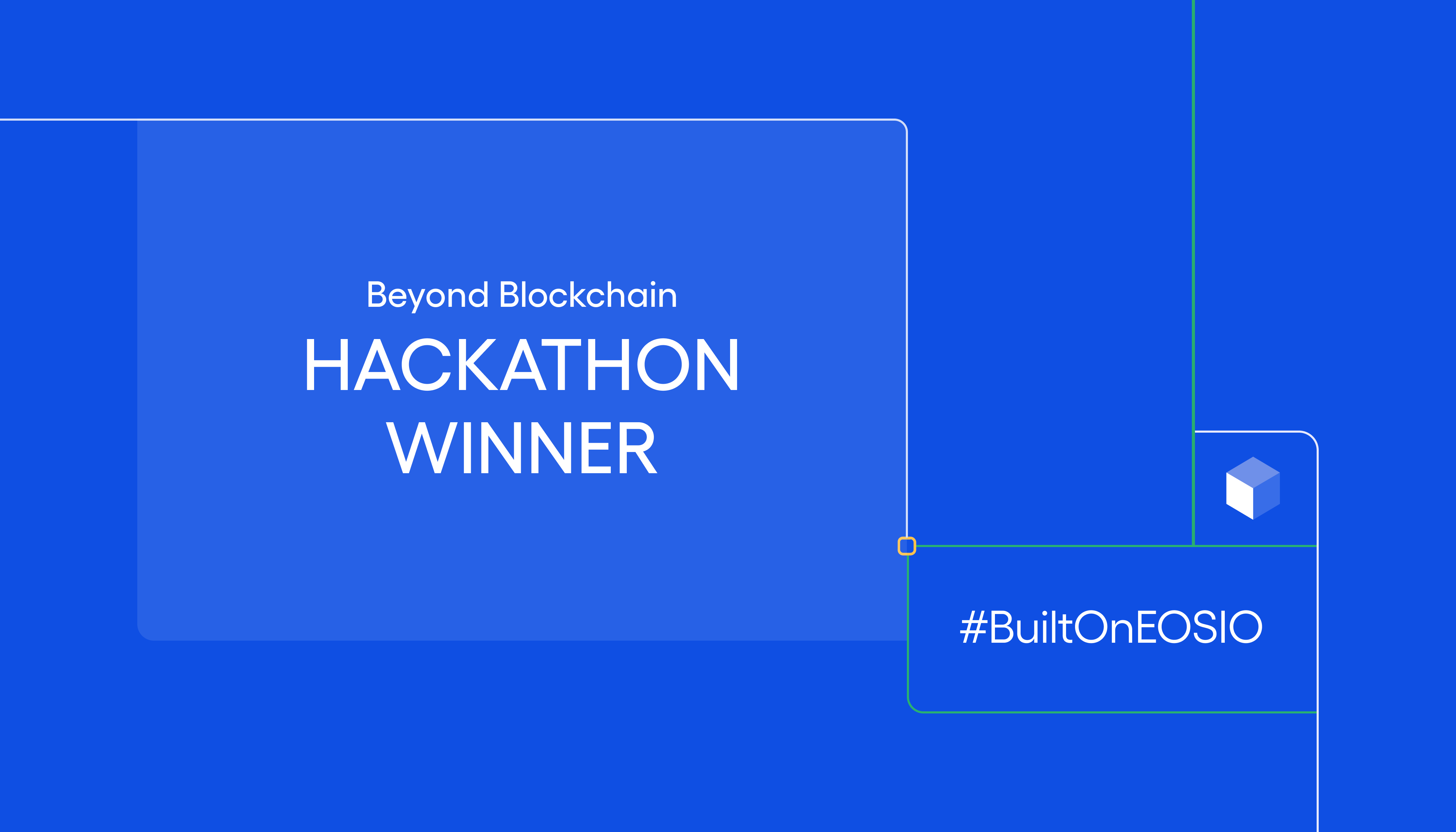
译文/Translated:
2021年EOSIO超越区块链黑客马拉松从3月2日持续到4月6日,这场为期一个月的比赛让参赛者设计解决方案,把云计算和EOSIO结合起来,构建具有全球影响力的项目。
本次黑马拉松由EOSIO和合作伙伴谷歌云,Galaxy Interactive,和 Mythical Games共同举办,共有来自107个国家的1315个参赛者参与竞争、创新、利用区块链和谷歌云的力量构建未来。
今年的获胜者是Dao Bull,它创造的平台让每个人都可以在几分钟内创建自己的分布式自治组织(decentralized autonomous organization,DAO)网络。Dao Bull团队和黑客马松的决赛选手gGoods和Recoverable Online Wallets还有机会向谷歌和Block.one展示自己的项目。
社区自治
DAO是一个自治组织,它由许多参与者共同管理,而不依赖任何一个中心化的个人或实体。DAO可以让社区管理集体资源,且不会发生腐败现象,但是,建立和管理DAO很复杂。Dao Bull利用EOSIO的规模化和效率以及谷歌云的社会和社区管理工具构建了去中心化基础架构。
Dao Bull团队成员、Big Picture Software的用户体验(UX)团队总监Callum Dickson说,团队想增强构建社区的工具包。“如果这些线上社区能有效地积累资金,那会发生什么?如果它们能有效管理资金分配的方式,能比大多数银行有更高一层的数字资产安全,能比大多数国家有更先进的治理架构,这又会发生什么?”
Dao Bull项目经理Simone Ruggeri把该项目的目标比作公共社区公园。社区规模不大的时候,让一小群个人管理该社区还是有意义的。但是,随着社区发展,公园的使用规模就增加了,这样,社区就很难决定怎么利用公园了。
基于名誉的投票
社区决定如何管理公共资源的一个方法是基于名誉的投票。Simone认为,等社区规模增长到人际关系影响决策的节点,名誉系统就可以很好地充当问责制的补救方法。 Dao Bull提供的社区工具能够根据每个人对社区的贡献测量参与者的名誉。
比如,Dao Bull允许DAO运营方铸造治理代币,发给任何被认为给社区带来价值的个人,从而创造奖励系统,建立和测量名誉。
等到要做影响社区空间的重要决策的时候,治理代币就启动民主投票过程,这样每个社区成员投票的权重和自己的名誉一致。
加入DAO和云技术
Dao Bull一开始就用EOSIO做基础,解决了现在主要平台遇到的规模化和资源管理的问题。“有了EOSIO软件,我们能让用户创造和管理自己的DAO,而不用支付大额费用。” Dao Bull团队成员和区块链开发师Marco Ruggeri说。
因为交易费用低,一大批用户就可以通过利用Dao Bull的社区构建工具箱实现自己的野心。
Dao Bull的网页工具让每个人都可以快速设置自己的DAO,为不同的参数调整设置,包括参与者、投票、资源分配、治理等。搜索功能也让用户能够浏览现有的DAO项目社区。
要启动DAO,用户首先需要根据提示连接自己的EOS账户。接下来就要设置组织名及其描述。之后,配置投票设置,包括投票持续时间、支持和通过熵值。这些设置会影响平台上的所有提案,必要时候也可以重新配置。
定义投票设置之后就要填写股东设置信息,包括股票数量、股票代码、每个股东的账户地址和账户状态。尽管也可以之后重新配置这些设定,但目前一旦设定了股票总量,这个值就不能改变了。
完成了前面几步之后,有必要检查设置、确认、创造新的DAO。Dao Bull的混和系统利用EOSIO管理股东、财务、链上投票功能,而论坛、事件管理、文件存储库则利用谷歌云基础架构实现。
在产品的未来迭代中,Dao Bull还打算继续推出新功能,包括支持工资系统、看板、社交、众筹、权限、第三方开发者的应用中心。我们期待着这些功能不断壮大项目。
建立在EOSIO之上?
我们的 #建立在EOSIO 系列展示了利用EOSIO科技的一些卓越的项目,它们都能为我们更加安全和联系的世界添砖加瓦。如果您想给我们下一个阶段的项目提建议,请给我们的开发者关系小组发送邮件spotlight@block.one
了解EOS VC如何通过战略性投资和风投合伴基金支持EOSIO生态,请访问 vc.eos.io
–Block.one开发者关系小组
原文/Original:
The EOSIO Beyond Blockchain Hackathon ran from March 2 – April 6, 2021. The month-long event challenged participants to develop solutions that integrate cloud computing with EOSIO and to build projects focused on making a significant global impact.
Hosted with partners Google Cloud, Galaxy Interactive, and Mythical Games, the EOSIO Beyond Blockchain Hackathon brought together 1,315 participants from 107 countries to compete, innovate, and build for the future with the power of blockchain and Google Cloud.
This year’s winning submission came from Dao Bull, who created a platform that allows anyone to create their own decentralized autonomous organization (DAO) network in minutes. The teams from Dao Bull and fellow Hackathon finalists, gGoods and Recoverable Online Wallets, also won the opportunity to pitch their projects to Google and Block.one.
Autonomy for Communities
A DAO is an automated organization that is governed by numerous participants instead of any one central individual or entity. A DAO can provide a community an incorruptible means to manage shared resources, however setting up and managing a DAO can be complicated. Dao Bull reduces complexity and gives anyone the power to build a decentralized infrastructure with the scalability and efficiency of EOSIO and the social and community management tools of Google Cloud.
Callum Dickson, a member of the Dao Bull team and head of UX at Big Picture Software, relates that the team was motivated to supercharge the community building toolbox. “What would happen if these online communities could effectively pool capital? What would happen if they could effectively govern how that capital is allocated, had a higher level of digital asset security than most banks, and a more sophisticated governance architecture than most nations?”
Simone Ruggeri, Dao Bull project manager, describes the project’s ambitions along the lines of a public community garden. While the community remains small, it might make sense for it to be managed by a smaller group of individuals. However, as the community grows and the scale of the garden’s use expands, it can become increasingly difficult for the community to make decisions about how the garden should be used.
Reputation Based Voting
One possible way for a community to decide how to manage public resources is reputation based voting. According to Simone, reputation systems work best as a fix for accountability once communities scale beyond the point where interpersonal relationships play a role in terms of management. Dao Bull gives a community tools to measure participant reputation based on what each individual does for the community.
For example, Dao Bull gives DAO operators the option to mint a governance token, to be given out to anyone perceived as providing value to the community, thereby creating a rewards system to establish and measure reputation.
When the time comes to make decisions that affect the communal space, the governance token facilitates a democratic voting process where the voting power of each community stakeholder is proportional to their reputation.
Joining DAO and Cloud Technology
Dao Bull immediately set out to use EOSIO as a foundation, solving for scalability and resource management issues that senior platforms are currently experiencing. “With EOSIO software, we have been able to let the users create and manage their DAOs without spending a huge amount of fees,” explains Dao Bull team member and blockchain developer Marco Ruggeri.
With lower transaction costs, a wider range of individuals will be able to see their ambitions through by accessing Dao Bull’s community building toolkit.
Dao Bull’s web tool allows anyone to quickly set up their own DAO and adjust the settings for various parameters including stakeholders, voting, resource distribution, governance, and more. A search feature also allows users to browse through the existing DAO project community.
To launch a DAO, one must first follow prompts to link their EOS account. Next, an organization name must be set and a description provided. Following these steps, voting settings must be configured such as the duration for a voting period, and thresholds for support and approval. These settings will affect all proposals on the platform, and it is possible to reconfigure them as necessary.
Once voting settings are defined, information must be entered for shareholder settings, including the number of shares, a share symbol, as well as each shareholder’s account address and balance. Although these settings can also be reconfigured at a later time, at this time it is not possible to alter the value of the total number of shares after it has been set.
Upon completion of the steps prior, it is necessary to review the set up, confirm, and create a new DAO. Dao Bull’s hybrid system uses EOSIO to manage shareholders, financials, and voting features on-chain while features like the forum, event planning, and a file repository on Google’s Cloud infrastructure.
In future iterations of the product, Dao Bull intends to release additional features, including support for payroll, Kanban Boards, social, fundraising, permissions, as well as an application center for third party developers. We look forward to watching them as they continue to expand the project!
Building on EOSIO?
Our #BuiltOnEOSIO series showcases some of the amazing projects leveraging EOSIO technology to build a more secure and connected world. If you would like to suggest a project for us to feature please send an email to spotlight@block.one for our Developer Relations team to review.
– Block.one Developer Relations team
原文链接/Original URL: